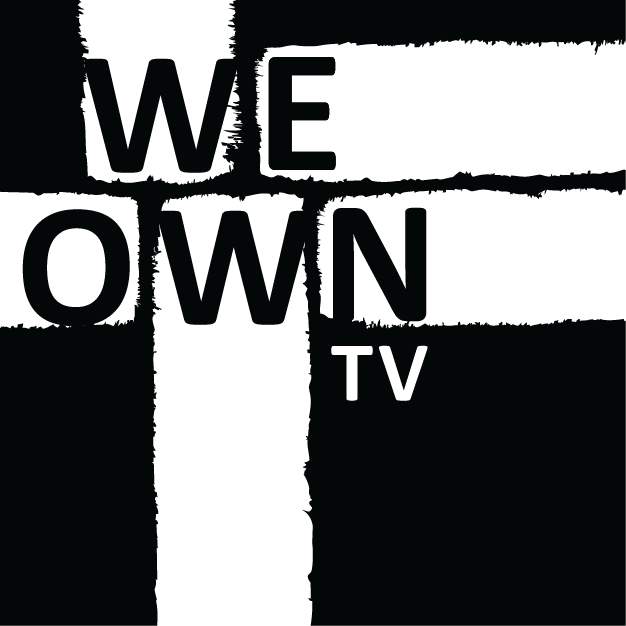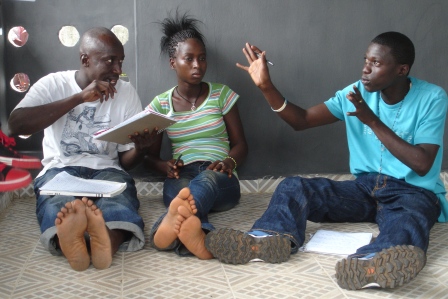Week Two: Mentor training develops peer leaders
“Dis na we yone Salone,” in Krio this means: This is My Sierra Leone.
Week Two: As work continues at the WeOwnTV: Sierra Leone Media Center, eight of the young filmmakers join us at the residence space to participate in mentor training. The eight mentors include Alluspa, Fanta, Frank, Mustapha, Arthur, Kanku, Earnest and Tyson.
WeOwnTV Mentors: Alluspa Soumah, Kanku Thoronka, Earnest Sesay, Mustapha Brima, Tyson Conteh, Fanta Jabbie, Arthur Pratt and holding the camera Frank T.O. M’Cormack.
It’s expected that this group of eight will serve as leaders at the media center and to their peers. Banker geared the week’s curriculum for documentary work to focus on pre-production planning; basic camera work; capturing and logging footage; selections and editing; and finally exporting the final work for screening.
Day One: Everyone is welcomed and introduced to the goals set for the mentor training. The group is led in both Christian and Muslim blessings for the work we hope to accomplish throughout the week and with the opening of the new media center.
Banker opens the day’s lessons by previewing examples of completed works to open the discussions regarding editing choices and films styles. The group discusses different filmmaking methods utilized in each of the pieces. In addition, the group reviews the difference between narrative, which was the focus of last year’s workshop, and documentary work.
Though everyone is excited to get their hands on a camera (thanks to Anna Fitch and friends who sent us to Sierra Leone with 2 donated cameras; in addition to three laptops and a microphone), Banker explains the most important lesson of the week is not related to the camera or the computer at all. In fact, today’s lesson highlighted pre-production planning and a collaborative team writing exercise. Then we discussed how framing ideas is essential to filmmaking.
Banker demos camera operations during WeOwnTV Mentor Training.
The groups are split in to two groups of four to work as individual filmmaking crews. They are given the assignment of creating a 6-8 minute documentary film working with the theme, “This is My Sierra Leone.” Banker explains to the entire group that they are encouraged to begin discussing the theme and brainstorm how they would choose to tell the story of their Sierra Leone.
They are tasked with creating a production plan for the following day to present what shots they are planning for and logistically how they will execute their production schedule in 1 ½ days. After lunch, we take a short break for Banker to lead camera demos of the new cameras and each person takes their turn with focusing, white balancing and exposure. Work continues on the production plans and the day concludes with plans in hand and excitement to shoot their films the following day.
Day Two & Three: The majority of these two days have each of the crews running from location to location trying to get all the shots they have scoped in their production plans. They learn quickly that the weather is not always your friend and have to do some quick adjustments in the field to get their shots while making sure their equipment remains dry and in working condition.
Banker meets up with the team in town at the Media Center. He reviews the shots each team has completed and teaches them about reviewing their plans. Each group makes plan adjustments to ensure they get the shots of what they need for their stories before the fast-approaching deadline.
As the teams move about Freetown, navigating the weather to shoot their footage, WeOwnTV US is learning its own lessons regarding the challenges of working in Africa. Without easy access to expert equipment repair shops or an Apple store down the street, we are facing the lack of technology support that we take for granted in the United States. As two of our editing computers crash and a camera that travelled with us is not working properly, we need to make our adjustments to the instruction plans.
Frank T.O. M’Cormack, Kanku Thoronka and Ernest Sesay of Group Two in story discussions.
Day Four & Five: With some creative adjustments to curriculum for the logging, capturing and editing lessons, Banker brings the group of eight around a single computer hooked up to the TV for extra viewing area. Then each of the team split time to complete their work on the tapes they shot and when they are not on the computer, Banker encourages them to review their script and planning work to align it with the interviews and footage they remembered liking.
In the early part of next week, there will be additional lessons on finalizing and exporting an edited piece of work. In addition to the technical and editing lessons, the group will discuss the logistics of the Media Center to determine opening hours, how individuals will access the equipment and the rules of operation. Finally, a constitution will be drafted to present to the broader group when they arrive on Wednesday.
As the sun sets on the week, the team is excited about what they have learned and is looking forward to sharing their new knowledge with the broader team. With the larger group next week, the plan is to finalize the operation procedures, have the entire team sign the WeOwnTV: Sierra Leone Constitution; establish all their digital profiles and communication channels; introduce website functionality and do a day-long script writing intensive in preparation for the upcoming group collaboration—the production of a feature length narrative.



